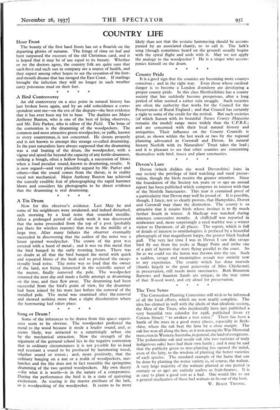Song or Drum?
Some of the inferences to be drawn from this queer experi- ence seem to be obvious. The woodpecker preferred the metal to the wood because it made a louder sound, and, as seems likely, was attracted to a surprisingly.. urban site by the mechanical attraction. Now the strength Of the argument of the guttural school lies in the negative contention that in ordinary circumstances it is not possible for so loud and resonant a sound to be produced by hammering wood, whether sound or rotten ; and, more positively, that the ordinary banging on a nut or a trunk of woodpeckers, nut- hatches, and the like does not in fact resemble the springtime drumming of the two spotted woodpeckers. My own theory for what it is worth—is in the nature of a compromise. During the performance the bird is in a state of quivering excitement. As soaring is the master attribute of the lark, so is woodpecking of the woodpecker. It seems to be more
likely than not that the ecstatic hammering should be accom- panied by an associated chanty, so to call it. The lark's song (though sometimes heard on the ground) usually begins with the spiral flight and ends with it. May we not apply the analogy to the woodpecker ? He is a singer who accom- panies himself on the drum.














































 Previous page
Previous page